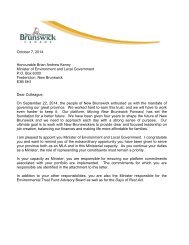cbd-ts-67-en
cbd-ts-67-en
cbd-ts-67-en
- No tags were found...
Create successful ePaper yourself
Turn your PDF publications into a flip-book with our unique Google optimized e-Paper software.
Section 2: Strategies to Address the Chall<strong>en</strong>ge of Marine Debris<br />
section 2:<br />
Strategies to Address the Chall<strong>en</strong>ge of Marine<br />
Debris<br />
2.1 INSTITUTIONAL RESPONSES<br />
2.1.1 Global/Regional<br />
The global importance of the marine debris problem is reflected in rec<strong>en</strong>t resolutions by the UN G<strong>en</strong>eral Assembly<br />
on oceans and the Law of the Sea. At i<strong>ts</strong> 65 th session, the UN G<strong>en</strong>eral Assembly urged states to support measures<br />
aimed at prev<strong>en</strong>tion, reduction, and pollution control of any source of marine debris. A resolution called on<br />
states to cooperate regionally and sub-regionally to implem<strong>en</strong>t joint prev<strong>en</strong>tion and recovery programs for<br />
marine debris (A/65/L.20). The most rec<strong>en</strong>t developm<strong>en</strong>t was the <strong>en</strong>dorsem<strong>en</strong>t by the UN G<strong>en</strong>eral Assembly of<br />
“The future we want”, the Outcome Docum<strong>en</strong>t of the United Nations Confer<strong>en</strong>ce on Sustainable Developm<strong>en</strong>t<br />
(also known as the Rio+20 Confer<strong>en</strong>ce). This <strong>en</strong>dorsem<strong>en</strong>t marked the most significant step in bringing ocean<br />
pollution in g<strong>en</strong>eral, and plastic debris pollution in particular, to the forefront of global priorities for sustainable<br />
developm<strong>en</strong>t (A/66/L.56).<br />
The Rio+20 Outcome Docum<strong>en</strong>t reaffirmed the concern for the health of the oceans and marine biodiversity,<br />
which is being negatively impacted by marine debris. It also committed nations to take action based on collected<br />
sci<strong>en</strong>tific data, by 2025 in order to achieve significant reductions in marine debris to prev<strong>en</strong>t harm to the coastal<br />
and marine <strong>en</strong>vironm<strong>en</strong>t (para 163). Furthermore, the docum<strong>en</strong>t recognized the importance of adopting a<br />
life cycle approach, and of further developm<strong>en</strong>t and implem<strong>en</strong>tation of policies for resource effici<strong>en</strong>cy and<br />
<strong>en</strong>vironm<strong>en</strong>tally sound waste managem<strong>en</strong>t. It called on nations to develop and <strong>en</strong>force compreh<strong>en</strong>sive national<br />
and local waste managem<strong>en</strong>t policies, strategies, laws and regulations, including those pertaining to plastic waste<br />
(para 218). With the <strong>en</strong>dorsem<strong>en</strong>t by the UN G<strong>en</strong>eral Assembly of the Rio+20 Outcome Docum<strong>en</strong>t, measures<br />
to address marine debris were included among global priority actions to assure sustainable developm<strong>en</strong>t.<br />
There are multiple global legal instrum<strong>en</strong><strong>ts</strong> and voluntary agreem<strong>en</strong><strong>ts</strong> aimed at the prev<strong>en</strong>tion and managem<strong>en</strong>t<br />
of marine debris, both on land and sea. Curr<strong>en</strong>tly, the most applicable overarching legal framework addressing<br />
marine debris is provided by the United Nations Conv<strong>en</strong>tion on the Law of the Sea (UNCLOS). It <strong>en</strong>tered into<br />
force in 1994 calling for the protection of the <strong>en</strong>tire marine <strong>en</strong>vironm<strong>en</strong>t from all sources and types of marine<br />
pollution, including marine debris. UNCLOS does not directly address the issue of terrestrial waste reduction,<br />
except for Article 207 calling on states to pass national legislation combating pollution from rivers, estuaries,<br />
and pipelines. Among the more specific agreem<strong>en</strong><strong>ts</strong> regulating differ<strong>en</strong>t sources of marine debris are:<br />
The Confer<strong>en</strong>ce of the Parties to the Conv<strong>en</strong>tion on Biological Diversity (COP 10), in i<strong>ts</strong> t<strong>en</strong>th meeting,<br />
provided an overarching framework for addressing impac<strong>ts</strong> of human activities to marine biodiversity in<br />
i<strong>ts</strong> decision X/29. In this decision, the COP noted an urg<strong>en</strong>t need to further assess and monitor the impac<strong>ts</strong><br />
and risks of human activities on marine and coastal biodiversity, building upon the existing knowledge<br />
(paragraph 68); requested the Executive Secretary to work with compet<strong>en</strong>t organizations which conduct<br />
marine assessm<strong>en</strong><strong>ts</strong>, including the United Nations G<strong>en</strong>eral Assembly Regular Process for Global Reporting<br />
and Assessm<strong>en</strong>t of the State of Marine Environm<strong>en</strong>t including Socioeconomic Aspec<strong>ts</strong>, the Food and<br />
Agriculture Organization of the United Nations, the United Nations Environm<strong>en</strong>t Programme, the United<br />
Nations Educational, Sci<strong>en</strong>tific and Cultural Organization (UNESCO), Intergovernm<strong>en</strong>tal Oceanographic<br />
Commission (IOC), the International Maritime Organization (IMO) and International Seabed Authority<br />
(ISA), and other relevant organizations and sci<strong>en</strong>tific groups, to <strong>en</strong>sure their assessm<strong>en</strong><strong>ts</strong> adequately address<br />
biodiversity concerns in marine and coastal commercial activities and managem<strong>en</strong>t, and, as necessary,<br />
where gaps are found, work with these ag<strong>en</strong>cies to improve the consideration of biodiversity in assessm<strong>en</strong><strong>ts</strong><br />
(paragraph 69).<br />
27



